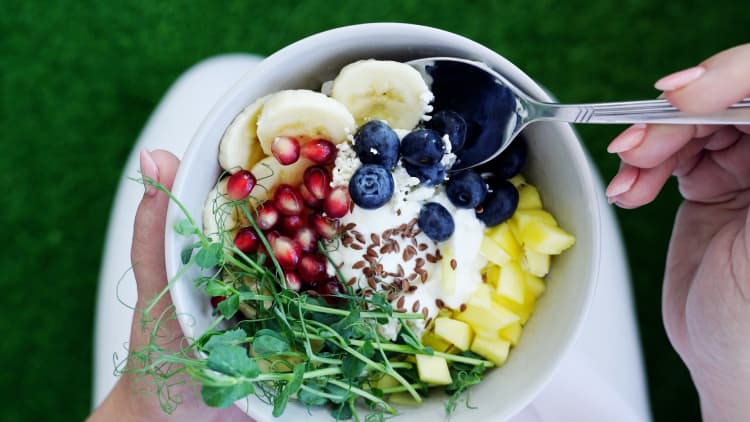Everyone's relationship with food is different, which is not a bad thing — depending on what that relationship looks like.
If you find you have a difficult or challenging relationship with food, you might want to consider a way of eating that is guided by your personal experience, rather than outside influence, like intuitive eating, according to Wendy Lopez, a registered dietitian.
"With intuitive eating, instead of focusing on external food roles to guide your eating choices, one of the goals is to cultivate trust in yourself when it comes to food and the innate instincts that you have," she says.
Lopez, who co-hosts nutrition podcast "Food Heaven" with Jessica Jones, is promoting a new partnership with Take Root Organics.
Often, diet culture can influence people to eat the foods they enjoy less and prioritize weight loss, she adds. "Intuitive eating kind of helps quiet the noise, and you're able to tune into what [eating] habits work best for you," Lopez says.
Here are some obstacles you may face as you adjust from adhering to social standards that surround eating, and begin to eat intuitively. Plus, how to overcome them.
2 things to know about intuitive eating
1. You can still meal plan and meal prep
Eating intuitively doesn't mean sacrificing structure altogether, says Lopez. In fact, you should still eat at least three meals a day, she notes.
"You also want to make sure you're nourishing yourself. Part of intuitive eating is also honoring your health and honoring your nutrition. So, it's important that you're getting the nutrients you need," Lopez says.
Instead of sticking to specific foods, aim for variety and you'll still be eating intuitively, she adds.
You can also use the MyPlate method to ensure that most of your plate is planned around plant-based foods, and you're receiving carbohydrates, protein and grains in each meal, says Lopez.
2. You can count calories initially, but don't make it a habit
Regardless of if you're eating intuitively or not, you should be aiming for at least 500 calories per meal, Lopez says.
"I don't recommend counting calories. But, if you're under-eating, it might be helpful to count calories for a few days, unless you've been medically advised to continue, just to make sure you're actually meeting your minimum needs," she says.
If you're following the MyPlate method, then you're likely meeting the recommended calorie intake, Lopez says. Consider adding avocados, nuts and seeds to your meals to up your intake.
"There is a misconception that you just eat whatever you want, whenever you want. But, part of intuitive eating is also listening to your body and how you feel," Lopez says. If after eating something too often, your body isn't reacting well to it, consider reducing your consumption.
But remember, "unless there is a medical reason or you have an allergy, there really isn't a need to say 'This food is completely off limits.' There's flexibility there. You get to decide how often you get to enjoy it. This is all something that you take into account, and you decide what you want it to look like for you."
Sign up now: Get smarter about your money and career with our weekly newsletter
Don't miss:



